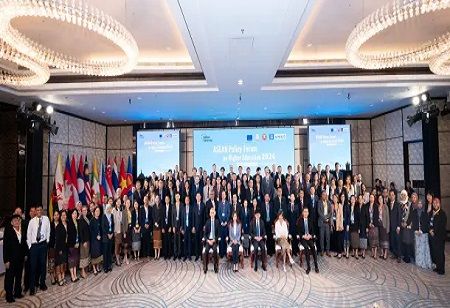-
The ASEAN Policy Forum on Higher Education 2024 held at Crowne Plaza Hotel, Vientiane, Lao PDR. This forum was held in cooperation between the Ministry of Education and Sports of Lao PDR, together with UNESCO and the EU-ASEAN Sustainable Connectivity Package Higher Education Programme (SCOPE-HE). Nuffic, the Dutch Organization for Internationalization in Education, managed this program in collaboration with the German Academic Exchange Service (DAAD).
Under the theme ‘Moving Higher Education Forward Together: Building Resilience and Flexibility by Connecting and Including All’, the forum gathered policy-makers, academics, industry leaders, and international organizations from across the ASEAN region to foster collaboration and tackle the challenges facing higher education. With a focus on resilience, adaptability, and inclusivity, participants explored strategies to strengthen ASEAN higher education systems in response to rapid technological advancements, economic shifts and environmental challenges.
The forum in Vientiane marks the beginning of an important series of policy dialogues, setting the stage for a progressive and sustained dialogue that will help ASEAN Member States and the EU work together towards building a more inclusive and connected higher education space. Over the next four years, six policy dialogues will be organized in ASEAN countries and Europe. These dialogues will cover key issues such as employability, digital skills and sustainable education.
The opening session featured remarks from distinguished speakers who underscored the importance of cross-regional cooperation in transforming ASEAN’s higher education landscape
Each speaker provided a unique perspective on the role of higher education in fostering sustainable development, regional integration, and resilience within ASEAN.
Throughout ASEAN, there is a need to accelerate the transformation of higher education systems to be more inclusive and learner-centered in line with Sustainable Development Goal Four (SDG 4) on quality education for all. Soohyun Kim called for joint action to listen to youth and engage across the public and private sector: ‘Achieving SDG 4 requires higher education to be a cornerstone for progress, supported by a whole-of-society approach. Let’s commit to making education the engine of shared prosperity and resilience.’
In his opening remarks, San Lwin stated, ‘As ASEAN continues to navigate an era marked by rapid technological advances and shifting workforce demands, the need for resilient, flexible, and inclusive higher education systems is pressing. Today’s forum is a valuable opportunity to collectively address these challenges and seize new possibilities for higher education in ASEAN.’
Veerle Smet said ‘The SCOPE Higher Education Programme, with a total funding of EUR 9.3 million, reflects our commitment to implement the ASEAN-EU Strategic Partnership (2023-2027), through the enhancement of people-to-people exchanges and cooperation in the areas of education, science and culture…‘I want to reaffirm the European Union’s commitment to continuing our strong partnership with ASEAN in the field of higher education, through the SCOPE Higher Education Programme, as well as our flagship programmes Erasmus Plus and Horizon Europe. I am confident that this forum will provide a platform for meaningful dialogue, contributing to the achievement of the ASEAN Higher Education Space by 2025.’
With Laos PDR holding the ASEAN chairmanship, the event also served as an opportunity for the region to strengthen its collective efforts in higher education and scientific research collaboration. The forum explored how ASEAN countries can better harness higher education to meet the demands of a rapidly changing technological landscape while ensuring equitable access for all.
Dr Lavanh Vongkhamsane emphasized the importance of internationalization efforts in higher education, stating, ‘Ensuring and driving the internationalization of higher education institutions, Lao PDR becomes true, there is a need to emphasize student mobility, credit transfer, accreditation, recognition, and collaborative research. Furthermore, there is a need to improve and create modern university management tools and strengthen regional cooperation which promotes collaboration and partnership among ASEAN, the European Union, and other stakeholders. In addition, there is a need to promote the Digital Transformation to Higher Education and support universities to establish the international course for the exchange program.’
In this ongoing dialogue, participants should develop practical policy recommendations that will lead the future of higher education in Southeast Asia. These efforts will be in step with the ASEAN Work Plan on Education 2021–2025 and the ASEAN-EU Strategic Partnership (2023–2027).
🍪 Do you like Cookies?
We use cookies to ensure you get the best experience on our website. Read more...

